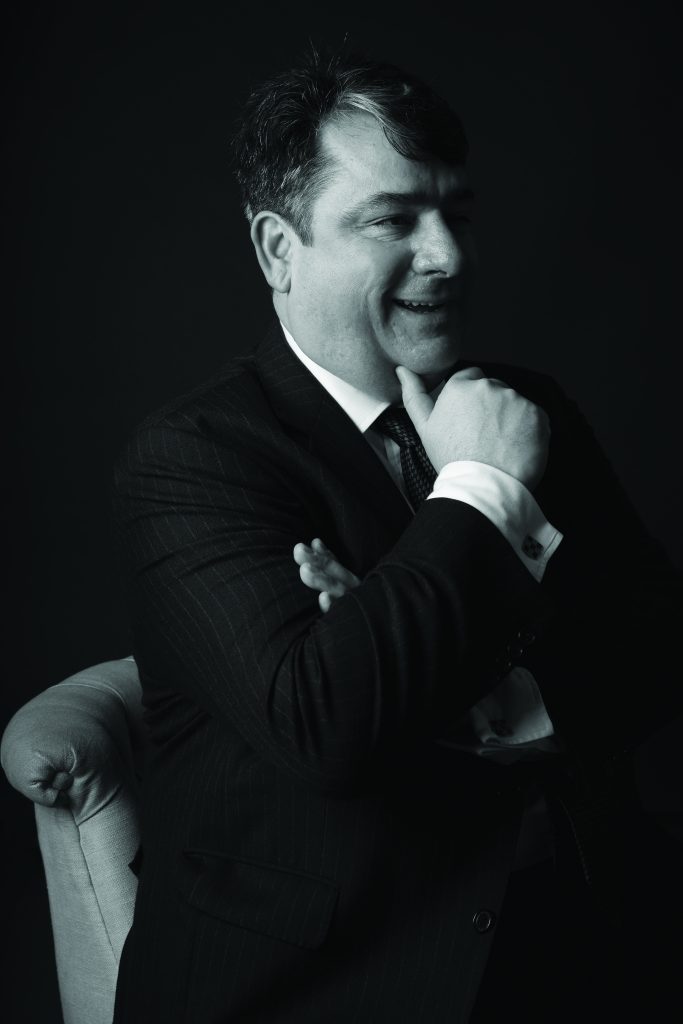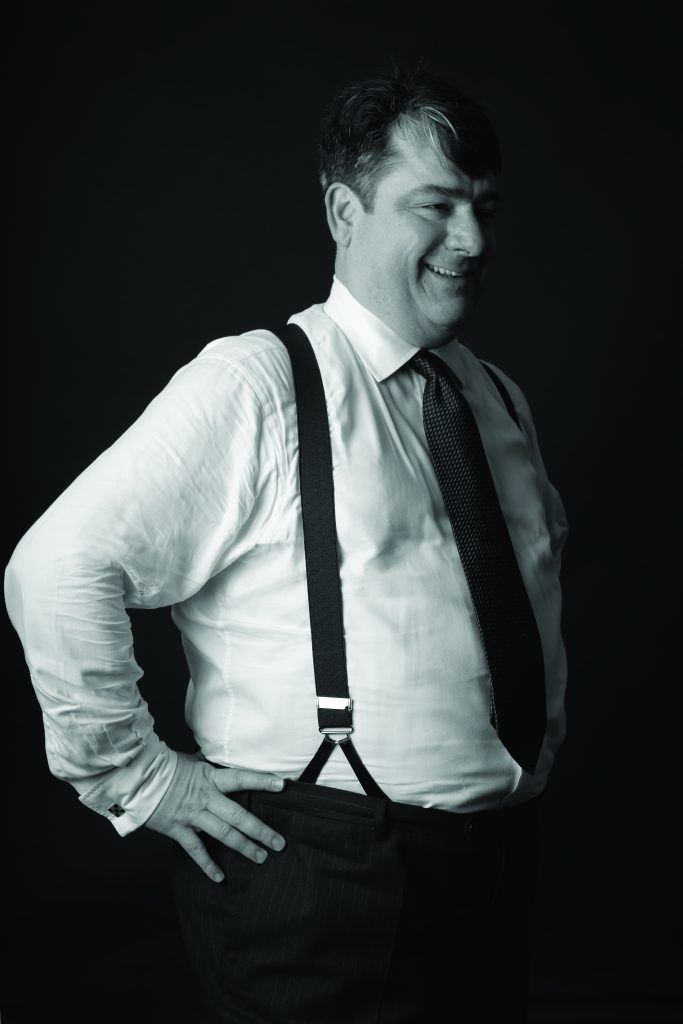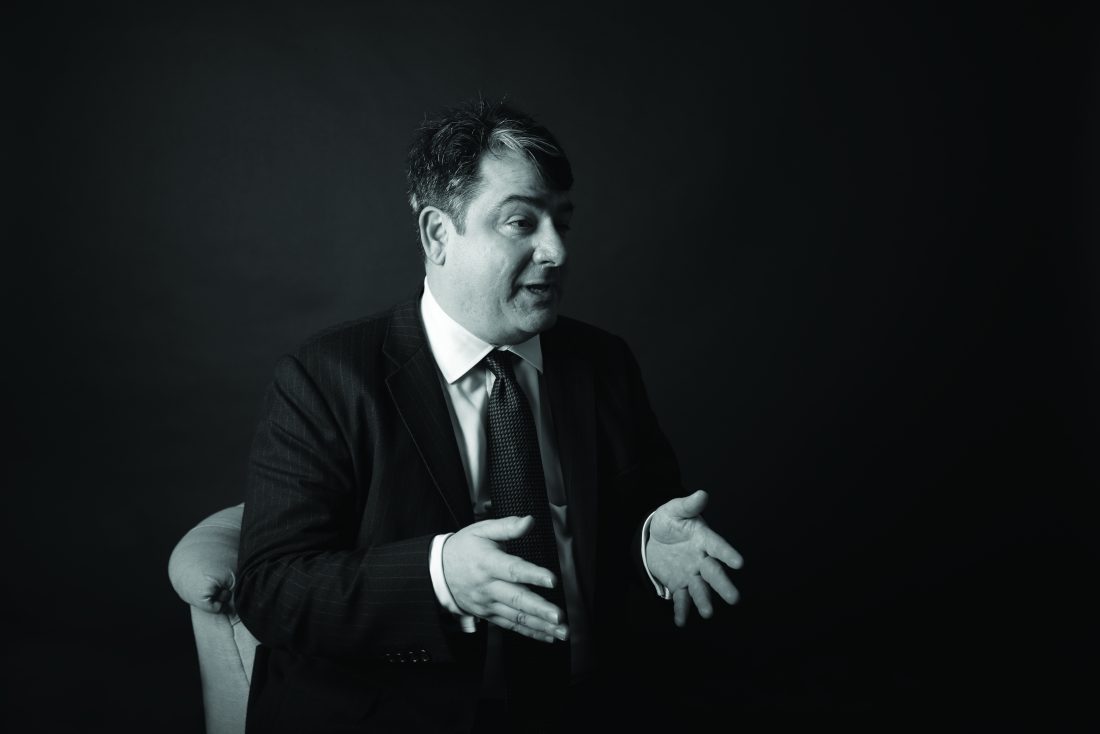Political blogger Paul Staines on his revered (and feared) site, pollsters and why fake news is being over-played…
Photography: Amanda Jackson

The reputation of Paul Staines, of political blog Guido Fawkes, precedes him. The 50-year-old is known as ‘the most feared man in Westminster’.
A man who, since launching his blog in 2004, has been at the helm of political reporting in the UK – breaking news, uncovering scandals, embarrassing MPs and even causing resignations. Staines has been described as ‘controversial’, ‘mischievous’ and ‘difficult’, and has openly stated himself that he’s ‘hot-headed’ – something he attributes to his Irish heritage.
As you can imagine, these are all components that don’t exactly scream ‘this will be an enjoyable interview’, so when at 10am (when the interview is due to commence) on a cold day at a studio in Bermondsey, Staines is no-where to be seen, there is a slight sense of relief… ‘Perhaps it’s for the best… Perhaps he isn’t the right interview for Blogosphere anyway… Perhaps we should schedule someone else in instead…’ Staines does turn up, though. An hour late.
Considering his aforementioned reputation, we expect him to be belligerent/indifferent and unapologetic. This couldn’t, however, be further from the reality.
In fact, not only is Staines very sorry for being late with a full and remarkably honest excuse (he’d been at his office party until 5am dabbling with Class A narcotics and, after blacking out, woke up to a reminder on his phone – at 10am – that this interview was scheduled in), he’s also surprisingly likeable. He’s punchy, yes, but not nasty. Not nasty at all. And of course he’s the right interview for Blogosphere.
After the political upheaval the world has experienced over the past year, who better to speak to – in a blogging magazine – than the country’s leading political blogger?
The Guido Fawkes site, which publishes short news stories in a right-wing tabloid-esque style and is known as the ‘trade press for Westminster’, receives an average of 100,000 hits a day and, across social media platforms, has close to 300,000 followers (220,000 of these are on Twitter).
“I lost £10,000 on Trump getting in,” Staines says when we ask about the turbulent politics of late.
“He got himself – very unexpectedly – elected. All the experts and pollsters were positive it was going to be different from Brexit.
“I lost a lot on Brexit, too,” Staines continues.
“I don’t know what to believe about polling anymore. Over the years, I’ve trusted the pollsters to be objective, but something big has gone wrong.”
“I think what’s changed,” Staines says, “is social media and this idea of the echo-chamber filter bubble. People in times gone by used to buy newspapers to confirm their prejudices – Telegraph, Guardian – but now the algorithms and the selection of who you follow on social media means you are quite surprised when something alternative happens.”
Being able to successfully read and interpret the political leanings of social media users – and filter through this echo chamber – is something that pollsters are going to have to improve upon if they’re to be trusted in future, Staines explains, for social media is now part and parcel of political campaigns.
“The big difference in political campaigning we’ve seen over the last decade is digital. Digital is now baked into the campaign – it’s not an after- thought or an add-on – it’s integral.

“Twitter is the first battle ground, but when it comes to reaching voters, Facebook is key. The Tories spent a fortune on Facebook.”
Staines’s favourite form of social media is Twitter and “except in elections” he thinks it’s the most important political tool.
“I was an early adopter of Twitter in 2008; we just used it to put out headlines. At the time, I thought it was stupid – I couldn’t understand why 140 characters was better than an email. But then I saw it on my phone and realised its importance. Now when everyone wakes up – certainly in politics – the first thing they do is look at their phone and check Twitter. When spats go off and things happen, the instant rebuttal is on Twitter.”
Although Staines is a big fan of Jack Dorsey’s brainchild, the core of his business is the Guido Fawkes blog.
“I don’t want to be at the mercy of these big platforms,” he explains.
“I understand that some people have been very successful as, for instance, Facebook-only entities, but I’d be worried that someone could change my business model overnight.”
“Facebook is all about advertising spend now,” Staines continues.
“We haven’t gone with Facebook instant – the new publishing platform. Zuckerberg is saying ‘come on here – you’ll get 100% of the revenue, we just want your content and you can put your own adverts in the stream’.
“I just think that this year it’ll be 100% of the revenue, next year it will be 80% of the revenue and by the end of it, we’ll be giving him the content for 10% of the revenue. I’m worried that you’re giving away your content and the only one who’s going to win is Mark Zuckerberg.”
Facebook have also been at the heart of the fake news scandal. As a publisher on the platform, is this a worry for Staines?
“I think it’s being overplayed,” he says.
“I think that some operations which are propagandist operations do fake news, but it’s very different from a newspaper getting something wrong – or falling for a spoof of some kind.
“Fake news, particularly with the whole Russia thing [it was alleged that a Russian propaganda effort helped to spread fake news to undermine Hillary Clinton’s election campaign and help get Donald Trump into the White House], is another way of saying propaganda. I think Hillary [Clinton] getting up and saying fake news got Trump into the White House just sounded a bit bitter. I don’t think it’s true.
“I think people are twisting it now and if you don’t agree with the editorial line of a publication then you’re calling it fake news. It’s been overblown.”

Reaction to disagreeing with editorial lines has escalated in recent months, resulting both in the StopFundingHate campaign [which aims to stop companies from advertising in UK newspapers that it argues use “fear and division to sell more papers”] and City University’s Student Union passing a campus ban of papers such as the Daily Mail, The Sun and The Express.
“I thought that [the campus ban] was very stupid. Student unions are often dominated by left-wing activists. City has quite a good media faculty and luckily most journalism students are focused on getting their Masters degree, not on student union politics.
“The campaign against those popular tabloids shows just how out of touch left-wing activists are. You know, these are papers that people read!”
“With StopFundingHate,” Staines continues, “the argument was being made that the Mail were doing a lot of stories about immigration and were inciting division. It’s a very dangerous situation when you’re going to boycott papers because you don’t agree with their editorial line. I mean, it’s up to the companies – they can do what they like; they’re free to withdraw their business. But I would be worried about that; it defunds journalism and it will lead to more closing of minds.
“If advertisers only advertised in publications they agreed with – certainly with political advertising – then there’s no point because there would be no-one to win over.”
Staines is familiar with people disagreeing with his site’s editorial lines. “We get a lot of abuse,” he says.
“We get a lot of abuse in all media. Sometimes I forget when I’m not logged in just how many people I’ve muted or blocked – you have to have a thick skin.”
Staines will block people “if they’re being gratuitously offensive” but mainly he “mutes people” because he gets so many @s. His site uses comment control software to weed out any racial pejoratives, but cannot monitor it all.
“We receive more than 500,000 comments a year,” he says.
“If we were to read every single one, we wouldn’t get anything else done.” Attacks are not just aimed at his blog, Staines receives abuse personally, too.
“Anonymity makes people brave,” he explains.
“Occasionally someone will send me abuse and talk about my parentage or something like that – and their Twitter bio will say who they are, so I’ll ring them up: ‘Hi, it’s Paul Staines. About me being a c***. I thought you’d like to tell me to my face.’ It’s fantastic!”
The unpleasant undercurrent is on the rise in social media and although Staines himself manages to brush off the abuse that comes his way, he is worried about the effects growing up in an online world might have upon his children. Staines has two daughters who are 9 and 11.
“It’s tough. I think my plan is to try and keep them away from social media for as long as possible. I’m holding out for as long as I can on letting them have a smartphone, but I’m sure they’ll end up acquiring it somehow.
“I’ve told them that they’re not allowed private passwords – I’m kind of a Victorian father on that.”

Where Staines is based helps keep his children entertained in an offline existence. He and his wife left London some years ago and now live in Waterford – ‘the Old Country’ – in Ireland.
“It’s great, we live on a beach, have a couple of acres and dogs. And it’s all for the cost of a one-bed in London.”
His commute, however, is not so great.
“They used to have a direct flight from Waterford to Luton, but it went bust, so I now have a six hour commute. I fly in on Monday night and fly back on Thursday night.”
The three days in London is enough to keep the Guido Fawkes site ticking along and Staines checks in with his team from Ireland, too. Over a decade has passed since Staines launched his blog and hits on the site remain consistently high.
“Everyone told me it wouldn’t work,” Staines reflects.
“If I’d have followed the advice that I got from people then I wouldn’t have done it.”
For those interested in venturing into the world of social media, Staines suggests getting a grasp on video.
“I think video is going to be the future because people have now got fast broadband on phones. I think you’re going to have to get basic video skills because kids like it and are not going to read 1,000 words but will watch two minutes of video. That’s the big change I’ve noticed. I mean even look at the length of articles – the Spectator magazine’s articles are half the length compared to 10 years ago. People’s attention spans are going.
“Video is the thing people should crack. Mind you, I’ve been told that blogging is dying since I started. And 12 years later it’s still going strong…”
